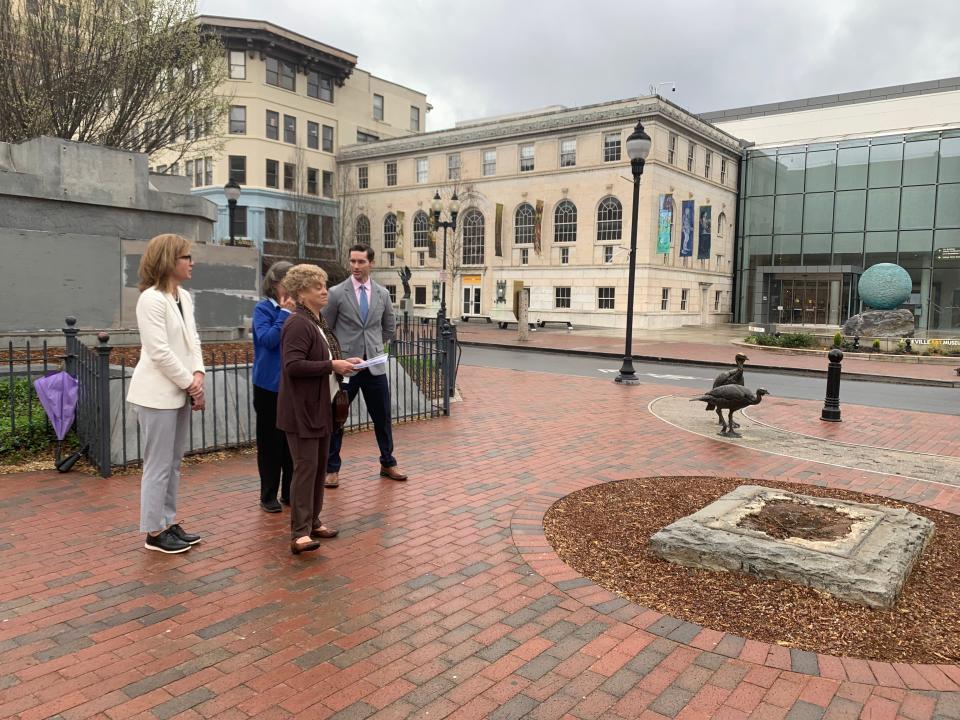Asheville wins NC Supreme Court case on Confederate governor Vance monument

- Oops!Something went wrong.Please try again later.
ASHEVILLE - The state's highest court has decided in favor of the City of Asheville in a challenge by a Civil War historical group that opposed the removal of a prominent monument to Confederate Gov. Zebulon Vance.
The North Carolina Supreme Court ruled unanimously against the Society for the Historical Preservation of the 26th North Carolina Troops, which had paid for the repair of the granite obelisk in 2015.
The court said the group failed to show that the removal amounted to a contract breach that must be remedied. In a twist, the justices said the N.C. Court of Appeals was wrong in saying the plaintiffs did not have standing — that they were harmed and that the city could repair the harm. But in appealing the case, Justice Phil Berger Jr., said the society failed to make the arguments about its original breach of contract claim.
"(The) plaintiff failed to argue the merits of its breach of contract claim in its brief to this court," Berger said.
Following the win, city officials and others gathered where the monument once stood. Mayor Esther Manheimer said in making the demolition decision, the city was prepared to be sued "and had a pretty good idea of what was going to happen," though noted the court's shift in that time from Democratic to Republican majority.
"Now we did see a change in this Supreme Court in N.C. after the election. So we had a lot of concerns. But we are very vindicated today with a unanimous decision from that court," Manheimer said.
Oralene Simmons, who served as co-chair on the task force that recommended removal, said her goal had been to help bring change, "to right some of the wrongs."
Simmons is a Western North Carolina native who at 17 was the first African American student to integrate the all-white Mars Hill College, now Mars Hill University, in 1961.
"We went to court in in Raleigh and we have been waiting on this day. And this day is finally here. And I can say: let the healing begin," Simmons said.

Monument removal part of Southern movement
The 75-foot-tall granite Vance Monument stood in Pack Square Plaza since 1898. All but its base was taken down as of June 2021 after Asheville City Council voted 6-1 to remove it in March of that year. That followed similar moves by Southern cities and racial justice protests sparked by the murder of Minneapolis resident George Floyd by that city's police.
Vance was not only North Carolina governor during the Civil War, but was an enslaver and white supremacist according to historical records. He was born in the Reems Creek community near present-day Weaverville and practiced law in Asheville, starting a political career in the N.C. Senate that included stints as governor and the U.S. Senate. During the Civil War he served as a Confederate officer before being elected governor.
After more than 100 years serving as a central downtown landmark, the monument was in disrepair due to mortar loss and water incursion. In 2015 the society raised $138,447 to repair it.
But following a move across the South to remove Confederate monuments, local racial justice protests and a historic 2020 vote for reparations for Black residents, the City Council and Buncombe County Board of Commissioners voted to take down the monument. Along with his ownership of slaves and leadership in the Confederacy, monument removal proponents cited Vance's writing about Black people that a "putrid stream of African barbarism" ran through their veins.
The society sued to stop the demolition. But in April 2021 Buncombe County Superior Court Judge Alan Thornburg dismissed the claim, saying "obligations of any potential agreement" between the parties had been fulfilled and the city had a right to take the monument down.
The society appealed and in April 2022 the N.C. Court of Appeals ruled in the city's favor, affirming the Superior Court's ruling and further adding that the society had no standing to bring the breach of contract claim.
In the appeal to the N.C. Supreme Court, society attorney H. Edwards Phillips acknowledged that a political entity such as the local governments could make the decision to remove the monument, but should do so "with due process and controlling law rather than by ad hominem attacks and appeals to rewrite history."
"While some may be offended by the monument and the individual whom it commemorates, others are inspired and are called to recall achievements," Phillips said in his initial petition to the court.
Assistant City Attorney Eric Edgerton in his arguments pointed to a recently decided monument case, the United Daughters of the Confederacy vs. Winston-Salem.
"This court held that a nonprofit association seeking to block the removal of a Confederate monument in Winston-Salem lacked standing to advance such a challenge insofar as it possessed no ownership interest in the monument and had failed to plead facts that would support a finding of taxpayer of associational standing," Edgerton said.
But the court said the society did have standing.
"This is so because our (N.C.) constitution provides that e'very person for an injury done to him in his lands, goods, person or reputation shall have remedy by due course of law,'" Berger said.
However, the justice said, the result was the same because “review in the Supreme Court is limited to consideration of the issues . . . properly presented in the new briefs.”
"As such, this issue has been abandoned by plaintiff."
Citizen Times Growth and Development Reporter Will Hofmann contributed to this report.
More: NC Supreme Court hears case of Vance Monument, which honors Confederate-era governor
Hot Springs hears from organization about plans to fund half of Robert E. Lee plaque costs
Joel Burgess has lived in WNC for more than 20 years, covering politics, government and other news. He's written award-winning stories on topics ranging from gerrymandering to police use of force. Got a tip? Contact Burgess at jburgess@citizentimes.com, 828-713-1095 or on Twitter @AVLreporter. Please help support this type of journalism with a subscription to the Citizen Times.
This article originally appeared on Asheville Citizen Times: Asheville wins NC Supreme Court case on Confederate governor monument

